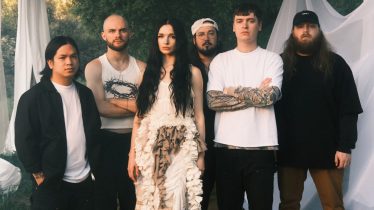Web Cover Story: Guitar Villain? The Battle Of Video Game Likenesses
STORY: Luke O’Neil
The cover song has long been an important element of a rock band’s arsenal. For a new band, it can serve as a means of getting immediate attention. For more established acts, inspired cover choices allow them to serve as curators of overlooked influences (cf. NIRVANA Unplugged). Still others like NO DOUBT have used covers (Talk Talk’s “It’s My Life”) as a playful bridge to their pop roots. Suffice to say, a lot of thought goes into picking the right song to convey just the right message about who they are, or who they want to be.
But what happens when you take that choice away from the band? That’s the question at the center of a conflict between those two bands and the video game company Activision, producers of hit games Guitar Hero and Band Hero. On Nov. 4, No Doubt filed a lawsuit against the company alleging that the game has “transformed No Doubt band members into a virtual karaoke circus act.” In the game, the band’s avatars can be manipulated into performing numerous songs by others artists: No Doubt claim that wasn’t part of the deal. Back in September, Courtney Love and the remaining members of Nirvana had a similar complaint about a Kurt Cobain avatar that could be used as a playable character in the game. In September, Dave Grohl and Krist Novoselic released a statement, reading in part: “It’s hard to watch an image of Kurt pantomiming other artists’ music alongside cartoon characters.”
You might be wondering what the big deal is. Weren’t both these bands known for covers? Perhaps. But when you consider some of the unholy pastiches the game allows, the bands’ ire begins to make sense. Cobain mugging like Flavor Flav? He may have had a good sense of humor, but probably not that good. No Doubt complained that bassist Tony Kanal can be used to sing “Just A Girl” in a female voice. There’s nothing wrong with it if he chose to do it himself, but in this case, the band says, he did not.
Or did he? The people at Guitar Hero think so. Eric Hollreiser, vice president of public relations at ACTIVISION told us that, until now, there have been very few–if any other–artists to express displeasure with their inclusion in the games. “Clearly, if you go back and look at artists who have spoken about their participation in the game over the last four or five years, there are a lot who have felt very positive about their participation.” That may be the case, but intent and results are often two different things altogether. As for the No Doubt issue, Hollreiser and Activision’s official statement reads:
”Some of the world’s most popular and iconic artists have been featured in Guitar Hero as playable characters, and we are proud to count No Doubt among them. Activision has a written agreement to use No Doubt in Band Hero–an agreement signed by No Doubt after extensive negotiations with its representatives, who collectively have decades of experience in the entertainment industry. Pursuant to that agreement, Activision worked with No Doubt and the band’s management in developing Band Hero. As a result, Activision believes it is within its legal rights with respect to the use and portrayal of the band members in the game and that this lawsuit is without merit. Activision is exploring its own legal options with respect to No Doubt’s obligations under the agreement.”
At this point, Hollresier says, nothing has come of Love’s threats to file suit against the company. And it may simply turn out to be a case of buyer’s remorse with No Doubt, who did not reply to requests to comment on this story. But what of the argument? Does Guitar Hero sympathize at all with claims like the ones No Doubt have made? Is it reasonable to assume that the band, even if they’ve legally agreed otherwise, might have a case for understanding? “That’s really a question for the bands and their management,” Hollresiser says.
It turns out there’s no easy answer there either. Jon Bon Jovi (around whom some of the controversy about Cobain has revolved) seems to agree games like Guitar Hero 5, in which he and Cobain share a potential overlap, are a little weird. Speaking to BBC News, Bon Jovi said, “I don’t know that I would have wanted it either. To hear someone else’s voice coming out of a cartoon version of me? I don’t know. It sounds a little forced.”
Opinions in the gamer community are mixed as well. “I think there’s a little bit of a gray area there when you talk about how artists are portrayed in these games,” says Emmanuel Petti of That Videogame Blog. “I think it really depends on if they’re still alive or not. I think when the artist is still around to defend themselves, the responsibility lies in their hands to explicitly make sure their image is portrayed the way they want it to be. But I think in the case of deceased artists like Cobain, some responsibility lies with the publishers and developers of a game to make sure that the image of the artists represents what that person was like or would have wanted. Something just doesn’t sit right with an artist like Cobain singing Bon Jovi songs regardless of the legality of it. It potentially sets a nasty precedent and before you know it, we have Jimi Hendrix strumming to Miley Cyrus and Buddy Holly rapping next to Jay-Z in DJ Hero.”
Petti’s argument is an interesting one. The specifics of the No Doubt legal case have yet to play out, but even if everything is legally sound, from a music fan’s standpoint, one wonders if it is right. “How much does having Cobain sing Bon Jovi songs actually add to the experience of the game?” asks Petti. “If anything, it detracts from it. So why even bother?”
Other artists don’t see it as a big deal. Jeph Howard of THE USED said, "The idea of being able to become your favorite musical icon for a game is fucking awesome. Who cares if you’re not playing the same band’s songs? That’s not the point. The point is to have fun. It’s a video game not a documentary." SMASHING PUMPKINS Pumpkins frontman Billy Corgan–a character in Guitar Hero World Tour alongside Paramore’s Hayley Williams, Jimi Hendrix and Ozzy Osbourne–finds it a harmless curiosity. Corgan says that in regard to any potentially incongruous in-game mash-ups, “I had no reservation, because it’s just a game. I understand other artists I respect having a problem with it. But I just don’t see it as a big deal. I think it’s kinda funny to see me singing some song I don’t even know."
It is funny, and that’s sort of the point. There may be no such thing as a sacred cow in a time of musical pastiche acts, freedom of information on the internet (aka stealing), and a general demystification of the rock star as anything more than a man or woman doing a job well. But while it’s refreshing to see artists express a sense of humor about themselves, your image is your image. With megastars like Metallica and Aerosmith, for whom Guitar Hero has produced their own specific, segregated titles, image is easier to manage. In Band Hero and Guitar Hero 5, where Cobain and No Doubt are in the mix with other artists’ music, not so much. It’s something that was a major concern for Harmonix Music Systems, MTV Games and Electronic Arts, the companies behind The Beatles: Rock Band.
“We knew from the start that we didn’t want to turn the Beatles into puppets and have their avatars singing other people’s songs from the Rock Band library,” says Paul DeGooyer, senior vice president of Electronic Games and Music at MTV Networks Music Group. “That just felt wrong to us on many levels and was never presented to them as a possibility. That’s why the Beatles game is a walled garden with its own downloads.” The Beatles, however, are still the Beatles, and carry that weight, so to speak. But for a generation of kids who grew up comfortable with the idea of digital representations of themselves, Nirvana were their Beatles. At this point, for bands such as Nevada screamers ESCAPE THE FATE, the idea of exposure through video games is a given. Their song “The Flood” was featured as a downloadable track as part of the Warped Tour Pack for Rock Band. “We’d be comfortable with it,” says Escape The Fate drummer Robert Ortiz. “We come from that generation.” But when it’s a beloved musician who represents something meaningful to a lot of people, it’s a different story.
“There comes a point where you’ve got to realize certain people stand for shit,” says Ortiz. “I’m not personally the biggest Nirvana fan, but I know at the time when Kurt Cobain [was alive], he was against anything that resembled pop and cheesy-ass shit and he wanted everything to be real. Now that he’s deceased, he can’t control his own legacy. He has other people making decisions and making money off him. When he came out against all the hair-metal bands that were out at the time, he wanted to do something completely different. And then you go and you choose him as a character on a video game–and that sucks. You see him playing all those songs he would have been against, and he has no control over it.”
Nick Chester, editor of the video game site Destructoid agrees that consent is the crux of the issue. “I get why there’s a push to get these faces into games,” he says. “It’s all about mass-market appeal. It works particularly well with games like the Top 40-themed Band Hero, where the target audience is going think an animated Taylor Swift is the coolest thing since being able to browse the internet from your phone. You know, if Swift signed on the dotted line and was legitimately okay with players being able to make her sing the Spice Girls’ ‘Wannabe,’ that’s great and totally her choice. But if No Doubt were blindsided as they claim, that’s a different story. I think stuff like that could be potentially damaging to Activision’s relationship with bands and the music industry, especially with those musicians who value their long-term appeal as artists.”
Exposure is certainly the appeal for bands, particularly ones less well known than No Doubt, says Ortiz. “For musicians, it’s a chance for people to hear your music through a new outlet. Radio isn’t as big as it used to be, and MTV [as a video outlet] is gone. Guitar Hero is a great way for people to find your shit. Even for younger generations to get in tune with music they might not be exposed to. Everyone has heard of the Beatles, but they might not know their music. It’s a really great tool.” While Escape The Fate have only been on the Rock Band soundtrack at this point, what if they got big enough to become playable characters in future versions down the line? “I’ll take it,” Ortiz says, laughing. Performing pop songs, as well? “I don’t give a shit. I have a respect for all music. I like everything. I just think there’s a right way to do it. Aerosmith and Metallica, they did their own thing, but also had bands that they listened to growing up and influenced their sound. So you take them and perform those songs with the characters of Aerosmith or Metallica, because when they were young, they actually did play those songs. There’s a way to do it right. If you want to use me, I don’t care. As long as the kids see me and it allows them to hear my band’s name somewhere, then go for it.”
Chester concurs that the band-specific titles are good examples of the right way to do it. “I think Harmonix has proven that it’s completely possible to do this in a respectful way that pays tribute to the musicians,” he says. “Just take a look at The Beatles: Rock Band. There was a lot of room for error there, but it was handled carefully and with class, and that resonates with gamers and fans of the music. Even games like Guitar Hero: Aerosmith or Guitar Hero: Metallica were inoffensive in that it was the bands, for the most part, playing their own songs. To see Kurt Cobain singing ‘Bring The Noise’ with Johnny Cash on drums is more comical than anything else. You almost feel embarrassed on their behalf.” alt








